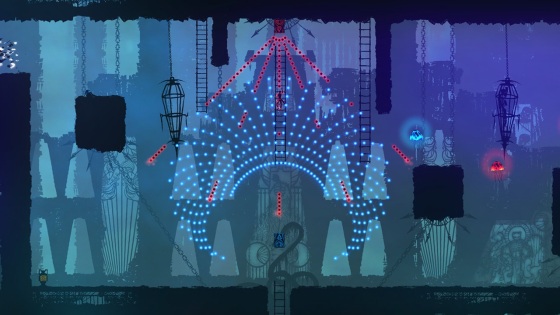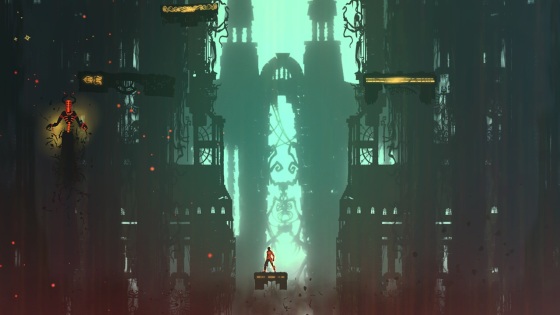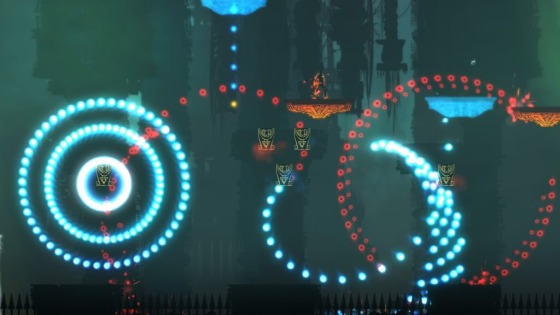 Every once in a while, an idea comes along that makes you ask "How has this never been done before?" Though the idea of bullet-hell combined with a 'polarity' system was very successfully implemented in the cult hit Ikaruga, the idea was hardly heard from again, until Outland.
Every once in a while, an idea comes along that makes you ask "How has this never been done before?" Though the idea of bullet-hell combined with a 'polarity' system was very successfully implemented in the cult hit Ikaruga, the idea was hardly heard from again, until Outland.
Overview
Outland casts you in the role of a man plagued by troubling imagery, who must either be a seer or on a vicious acid trip. He seeks the help of a shaman to put his visions to rest. The shaman's tasks send our hero through a journey of personal discovery, psychedelic visuals, and mad amounts of bullets.
Gameplay
At it's core, Outland is dreadfully simple: like another Castlevania title in the Metroid mold. The nameless hero has most skills that can be found in a platformer, with the exclusion of a double jump. Slides, triangle jumps, wall clings, and a three-hit slash flurry. As you progress, you unlock new abilities like special attacks, teleportation (for easy backtracking), and launch pad jumps. All very face-forward and native to anyone who's played more than one action-platformer, until you take the polarity switching mechanic into account. Shifting between red and blue phases primarily allows you to absorb bullets of the same color, and damage enemies of the opposite color. Again, simple, until Housemarque decides for this dualism to affect the world around you as well. At times, certain platforms can only be used when you're of the corresponding color. Other times, switching polarities will spur hazards such as spikes along your path. Rapid polarity shifts mixed with pitfalls, platforming, enemy assaults, and an overwhelming amount of bullets on screen create a very unique experience that ends up being simultaneously fun and frustrating.

When you've finished with the story mode, which is a passable narrative, replay factor is found in the different gametypes offered. An arcade mode allows you to choose your stage and play through that chunk toward the end of high scores and low times, with leaderboard support for you competitive types. Co-op exists strictly for the online world, so those planning on playing locally with a friend are assed out. It's really unfortunate that local co-op couldn't be successfully implemented for two reasons. Reason one is that it's a damn good time, obviously, especially since co-op consists of more than just killing enemies, such as puzzle solving. Reason two is that it's impossible to find a game online. The 4 or 5 separate occasions I've tried to find an online game, I was told there were no sessions available. 90% of the online population are playing either Halo, Gears of War, or Call of Duty, which unfortunately leaves a small sliver of folks to team up with in Outland. My timing was not good it seems.
Art Design
There is so much good happening in the design, and befitting of a game about polarity, the positive is balanced out by the negative. Outland is a beautiful, beautiful title. The Limbo-esque emphasis on silhouettes is really brought out by the lively colors found both in the foreground and back. Though not everything in the world features Tron strips of light, leading to more environmental missteps than I would normally succumb to. These things become hard to see at times, especially when the camera pans out and you're forced to navigate at a super wide angle. The open view illustrates the world well, showing you tons of incoming bullets, the lovely backdrops, and low keyed traps and enemies, which you'll do well to really look for during these wide angle situations.

Another questionable choice is the blue and red that you flash after sustaining damage. In the heat of intense platforming and bullet navigation, the last thing I want to do is rapidly flash the colors that I need complete control over to survive. I think it might have made more sense to flash between your selected polarity and the world's default yellow color, to better control your phase when damaged. It's easy to lose track of your alignment under an onslaught of ever-changing projectiles, increasing the probability that you switch incorrectly and lose more of your precious health.
Sound Design
Though the hero can sound a little goofy at times - such as exclaiming "whoa!" when teetering on a ledge - this nitpick is easily forgotten. Most of the stages are accompanied by a light, tribal inspired soundtrack infused with ambiance befitting of wherever you may find yourself: a jungle, a snowy mountain, a smoldering city, and so on. The music during the boss battles are as intense as the battles themselves, an epic arrangement of tribal symphonies that do well to illustrate the scope of the creatures you're pitted against. The final battle music especially, which I allowed to play in a paused state while I folded laundry, creating the most heroic household chores I've ever been part of.

Conclusion
Housemarque hits the mark with Outland. In my mind, a good platformer should be tricky and a bit frustrating, but it should also make you feel like you're in complete control, especially when you've hit a rhythm. Mission accomplished. The shortcomings of the design are little more than nitpicks, and the lack of local co-op can be dismissed, especially considering the $10 price tag. Besides, such would be a perfect addition for Outland 2: The Acid Flashback, don't you think?
Buy it if: You fancy Metroidvania, top-down shooters, and a frustratingly good time
Don't buy it if: You're looking for local co-op
The Score: 8 outta 10 Blasters!
